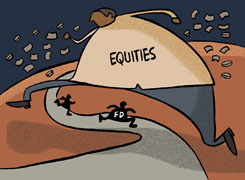I am a 45 year old lady with almost zero understanding of mutual funds. My monthly income is approx 2 lac. I have three LIC policy which have been around for almost 10 years now and the yearly premium is 150000 for the three. After calculating all monthly expenses I can still save around 50k a month, so please advice on the best investing options or mutual funds / SIP as I really want to start saving for my retirement.
Ans: First, let's appreciate your commitment to saving and planning for the future. At 45, you're taking a crucial step toward securing your retirement. You have a steady income of Rs 2 lakhs per month, and you manage to save Rs 50,000 monthly after expenses. This is a commendable savings rate. Your LIC policies have been running for 10 years with an annual premium of Rs 1,50,000.
You have good financial habits and a stable foundation to build upon. Let's explore the best ways to invest your savings, focusing on mutual funds and Systematic Investment Plans (SIPs).
Evaluating Your Current Investments
Your LIC policies are traditional insurance products. While they offer a safety net, their returns may not be sufficient for your retirement needs. These policies likely provide a combination of insurance and investment, but their growth potential is limited compared to other investment avenues.
Considering your goal of maximizing retirement savings, it's crucial to evaluate if these LIC policies align with your objectives.
Why Mutual Funds?
Mutual funds pool money from various investors to invest in stocks, bonds, and other securities. They offer diversification, professional management, and potential for higher returns compared to traditional savings options.
Here are key reasons to consider mutual funds:
Diversification: Mutual funds invest in a variety of assets, reducing risk.
Professional Management: Experienced fund managers handle investments.
Flexibility: You can start with small amounts and increase over time.
Liquidity: Easy to buy and sell, offering good liquidity.
Potential for Higher Returns: Over the long term, mutual funds often outperform traditional savings options.
Disadvantages of Index Funds
Index funds track a market index, aiming to replicate its performance. While they are low-cost and passive, they have limitations:
Lack of Flexibility: They cannot adapt to market changes.
Average Returns: They only match market returns, not beat them.
Missed Opportunities: They cannot capitalize on undervalued stocks.
Benefits of Actively Managed Funds
Actively managed funds have professional managers making strategic decisions to outperform the market. They offer:
Flexibility: Managers can adjust portfolios based on market conditions.
Higher Return Potential: Skilled managers aim to exceed market returns.
Risk Management: Active managers can mitigate risks through strategic investments.
Why Avoid Direct Funds?
Direct funds are purchased directly from the fund house, bypassing intermediaries. However, they have drawbacks:
Lack of Guidance: No professional advice for fund selection.
Complex Management: Investors need to track and manage investments themselves.
Potential Mistakes: Without expert help, there's a risk of poor investment choices.
Benefits of Regular Funds Through a CFP
Regular funds involve an intermediary, often a Mutual Fund Distributor (MFD) with CFP credentials. Advantages include:
Expert Advice: Professional guidance in selecting the right funds.
Portfolio Management: Continuous monitoring and adjustment of investments.
Financial Planning: Holistic planning aligning with your financial goals.
Starting with SIPs
Systematic Investment Plans (SIPs) allow you to invest a fixed amount regularly in mutual funds. They offer:
Discipline: Encourages regular savings.
Rupee Cost Averaging: Buys more units when prices are low, averaging out costs.
Compounding: Long-term investments grow through compounding.
Selecting the Right Funds
Given your goal of retirement savings, consider a mix of equity and debt funds. Here's a breakdown:
Equity Funds: Invest in stocks, suitable for long-term growth. They offer high returns but come with higher risk.
Debt Funds: Invest in bonds and securities, providing stability and regular income. Lower risk, but also lower returns compared to equity funds.
Balanced Funds: Combine equity and debt, offering a balanced approach. They provide growth and stability.
Recommended Allocation
Equity Funds: Allocate 60% of your savings. These funds will drive long-term growth.
Debt Funds: Allocate 30% of your savings. They will provide stability and reduce overall portfolio risk.
Balanced Funds: Allocate 10% of your savings. These funds offer a mix of growth and stability.
Action Plan for Your Savings
Review LIC Policies: Assess the returns and coverage. If they don't align with your goals, consider surrendering and reinvesting the proceeds in mutual funds.
Start SIPs: Begin with the Rs 50,000 you save monthly. Allocate according to the recommended allocation.
Monitor Regularly: Keep an eye on your investments. Adjust the allocation based on market conditions and financial goals.
Tax Benefits
Investing in mutual funds also offers tax benefits:
Equity-Linked Savings Scheme (ELSS): Provides tax deductions under Section 80C. It also has the potential for high returns.
Debt Funds: Offer indexation benefits for long-term capital gains, reducing tax liability.
Emergency Fund
Maintain an emergency fund equal to 6-12 months of expenses. This ensures you can handle unforeseen expenses without disrupting your investment strategy.
Insurance
Ensure you have adequate insurance coverage. Life insurance should cover at least 10 times your annual income. Health insurance is equally crucial to cover medical emergencies.
Financial Goals
Define your financial goals clearly. For retirement, estimate the corpus required and time horizon. This will help in planning the investment strategy effectively.
Final Insights
Your proactive approach to retirement planning is commendable. By understanding and leveraging mutual funds, you can maximize your savings and achieve financial security.
Prioritize reviewing your existing LIC policies and consider starting SIPs in a diversified portfolio. Regular monitoring and adjustments, with guidance from a Certified Financial Planner, will ensure you stay on track.
Building a retirement corpus requires a disciplined approach and smart investment choices. With a steady income and the ability to save Rs 50,000 monthly, you are well-positioned to achieve your financial goals.
Best Regards,
K. Ramalingam, MBA, CFP,
Chief Financial Planner,
www.holisticinvestment.in


























